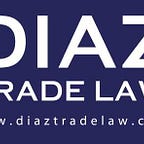Potential Relief from China Tariffs Coming
Originally published on Diaz Trade Law Blog
Background on Section 301 Tariffs
A key element of the U.S.-China trade war, initiated under the Trump administration and continuing through Biden’s first term, was the imposition of China tariffs under Section 301. Section 301 is a mechanism via which the President can retaliate against foreign countries that violate U.S. trade agreements or engage in acts that are “unjustifiable” or “unreasonable” and burden U.S. commerce. With regard to China, the U.S. Trade Representative (“USTR”) found that China’s acts, policies, and practices related to intellectual property and innovation are unreasonable or discriminatory and burden or restrict U.S. commerce. Accordingly, a broad set of tariffs were instituted. Section 301 tariffs for goods originating from China have been so expansive that U.S. Customs revenue has nearly doubled from $41.6 billion in FY 2018 to $71.9 billion in FY 2019 and $74.4 billion in FY 2020.
Since September 2020, more than 3,500 cases have been filed at the U.S. Court of International Trade by importers across a wide range of industries. This includes over a hundred complaints filed by Diaz Trade Law. In the lawsuit, importers who have paid tariffs under List 3 and List 4 are arguing that the tariffs were imposed contrary to law and are demanding a full refund.
To avoid harm to U.S. interests, the USTR instituted tariff exclusions for certain U.S. imports that would otherwise be subject to tariffs. While exclusions were broad and used heavily by importers during much of the last few years, the exclusions almost completely came to stop at the end of 2020. As of December 31, 2020, most goods formerly subject to exclusions are no longer subject to exclusions. The exception to this was a small subset of mostly COVID-related goods.
Trade Bill
On May 28, 2021, the U.S. Senate voted 91–4 to amend the United States Innovation and Competition Act to include the Trade Act of 2021. The larger bill has now been passed in the Senate and is being considered in the House. Among many other important developments, the Trade Act includes broad exclusion-related mechanisms. These include:
- Renewal and extension of expired exclusions — For prospective imports, the renewal of expired exclusions across Lists 1, 2, 3, and 4 would extend through December 31, 2022 regardless of when they originally expired.
- Opportunities for retroactive duty refunds for certain imports — For exclusions that expired on December 31, 2020, importers could recover all 301 duties paid on entries between December 31, 2020 and the bill’s enactment into law regardless of the liquidation status. The U.S. Customs and Border Protection would have 90 days to liquidate or re-liquidate entries and process duty refunds. Please note: there is no opportunity for retroactive recovery for entries that expired before December 31, 2020.
- Opportunities for reforming the exclusion process — The bill does not specify details on exclusion reform — but it does signal that USTR must expand its exclusion scope. Parties who were previously denied exclusions or did not file an exclusion request may have a second opportunity to request that USTR exclude their imports. The bill also requires USTR to initiate a new process for companies to petition for the exclusion of their imports.
Additionally, the amendment incorporates the Miscellaneous Tariff Bill (“MTB”) which would grant duty suspensions and reductions on various imports. The amendment also extends the Generalized System of Preferences (“GSP”), allowing imports to avoid duties on products imported from certain developing countries. For the full text of the amendment, please click here.
Although the amendment passed the Senate with a broad and bipartisan support of 91–4, the full bill has passed the Senate. It must now pass the House of Representatives and then be signed by the President. We expect the bill to become law, although revisions are expected in the House.
For a comprehensive understanding of all of the legislative and political developments pertaining to trade and customs, be sure to sign up for the webinar Trade Policy 201: 6 Months In — An Update on Biden & Congress on Trade on July 28.
Be Proactive — Get Your ACE Import Report Ahead of Time
Although there is still uncertainty whether the bill will become law and how it will look after it gets through the House, there is a lot you can do TODAY to prepare for the potential return of Section 301 exclusions and retroactive duty saving opportunities. We recommend you get your ACE import report card today. In our report cards, we pull and analyze your ACE data to identify issues with your import and export processes and identify opportunities for improvement. If the bill passes as it stands, having clear data on your exports and imports over the last 5 years can ensure that you are poised to take advantage of any duty-saving opportunities presented by the new law.
Contact Us
If you have questions on Section 301 or ACE, contact Diaz Trade Law today at info@diaztradelaw.com or 305–456–3830.
